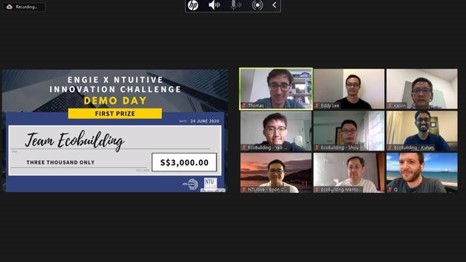It was a technology challenge with a unique twist. University students in Singapore, who participated in the inaugural ENGIE x NTU Innovation Challenge, were given eight months special access to a local hospital to creatively solve challenges around energy efficiency and smart buildings.
The winning team EcoBuilding from Nanyang Technological University, Singapore (NTU Singapore) used a system of multi-variant sensing for predictive controls of air-conditioning. They achieved more than 20% energy savings and improved comfort through machine learning of room occupancy and air quality metrics. Their prototype enables the air-conditioning system to be controlled by artificial intelligence.
Besides the AI software, the smart control solution from EcoBuiling also uses sensors to measure humidity, carbon dioxide and other room conditions.
“The current version of our AI-assisted smart control solution is targeted toward buildings with BEMS (Building Energy Management Systems). If the control software of the aircon systems is interacting with BEMS, our AI-assisted smart control system will also provide the supervisory control to the aircon systems. There is a possibility for our solution to be integrated with aircon control software in the future,” a spokesperson from EcoBuilding told FutureIoT.
According to EcoBuilding, the AI-assisted smart control solution can be installed into the existing BEMS servers of buildings with centralized HVAC as a supervisory control layer to the existing BEMS. The AI-assisted smart control system might require extra sensors depending on the sensor availability in the existing buildings.
“We envision the AI-assisted smart control solution will be available as building energy management system (BEMS). It could work as a plug-in module to existing BEMS or as standalone BEMS,” the team’s spokesperson said.
Team EcoBuilding was proclaimed the winner of the inaugural challenger after a final judging of the top three teams, which was head virtually on June 24. The winning team, together with the other two finalist teams at the final presentation have also received prototyping awards. Following this challenge, all three teams will continue to explore how to build a startup with ENGIE and access further venture capital funding.
Introducing AI to hospital operations
The competition was jointly organised by ENGIE Factory Asia-Pacific, the innovation arm of French energy company ENGIE Asia Pacific, and NTUitive, the innovation and enterprise company of NTU Singapore.
The facilities of the JurongHealth Campus – which is comprised of the Ng Teng Fong General Hospital (NTFGH) and Jurong Community Hospital (JCH) – provided the test environment; while the competing teams were mentored by industry executives in sustainability, energy and smart city technology, and received up to S$10,000 in prototype funding.
“We are delighted by this opportunity to collaborate with NTU and the JurongHealth Campus to support our customers’ low carbon transition initiatives. We are impressed by the works of the participating students and we are glad that through this engaging challenge, we will discover innovative solutions for the benefits and continual improvement of our customers. This partnership is the testament of our commitment to further enhancing energy efficiency for the country, especially in the healthcare sector, through our expertise in provision of sustainable client solutions,” said Pierre Cheyron, CEO, ENGIE South East Asia.
Ensuring service efficiency and optimisation of electrical systems is an important part of ENGIE’s services for its customers. Through the partnership with NTFGH, the students proved how artificial intelligence and other technologies can be incorporated seamlessly into hospital operations for predictive maintenance, digitisation of services and ultimately, autonomous building management.
Ng Kian Swan, chief operating officer of NTFGH and JCH, and director of Jurong Medical Centre said hosting the event was an “important gateway” in the competition.
“Healthcare institutions are critical areas where we need to continually innovate and adopt the latest technologies to improve the health environment for safe and quality care,” he said. “Hosting the student on our campus was an important gateway in the competition where they were able to work with live data and test the feasibility of their theories when applied to an actual environment – and further refine their ideas for a scalable solution.”
Highlighting the importance to develop youth in the community, Quentin Vaquette, managing director of ENGIE Factory Asia-Pacific said: “We believe that entrepreneurs will play a pivotal role in driving the energy transition toward renewable and sustainable sources. This collaboration represents a platform for nurturing talents who are tackling massive challenges in the future of energy and smart city.”
Dr Alex Lin, interim chief executive officer of NTUitive, echoed the same sentiment.
“Innovation Challenges are an excellent avenue that exposes students to realistic business problems. Working with industry mentors, business owners, and multi-disciplinary peers, students gain deeper insights into the issues and discover possible solutions,” he said. “The ENGIE x NTU Innovation Challenge doesn’t just find a solution to the problem, it enables ENGIE to discover talents, and allows students to learn outside the standard curriculum.”



